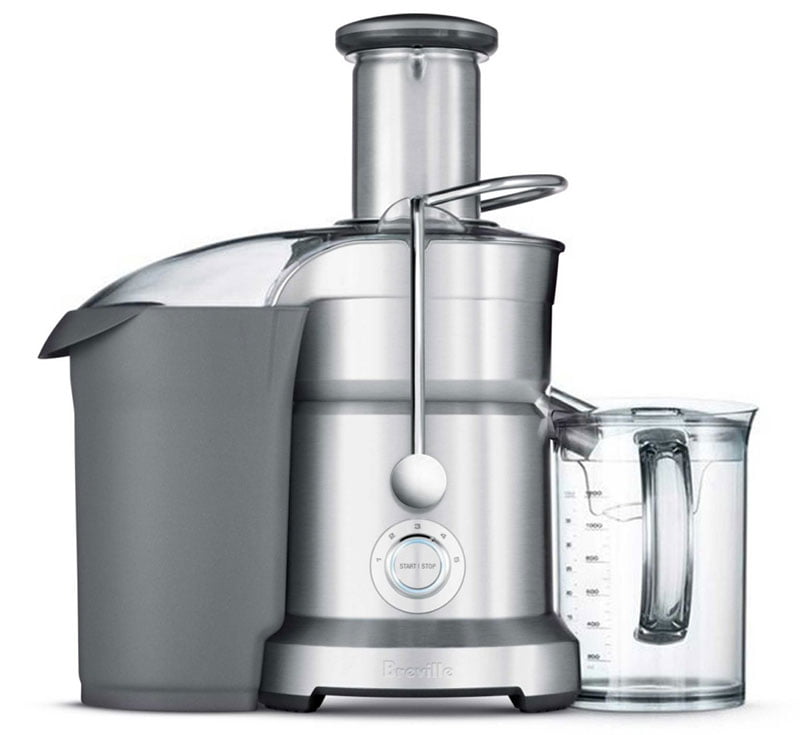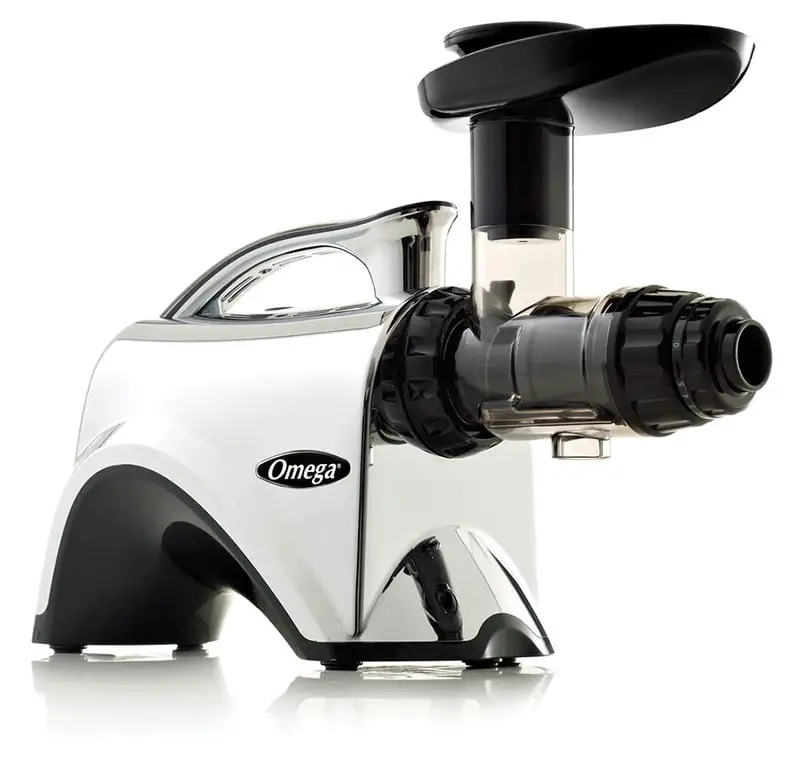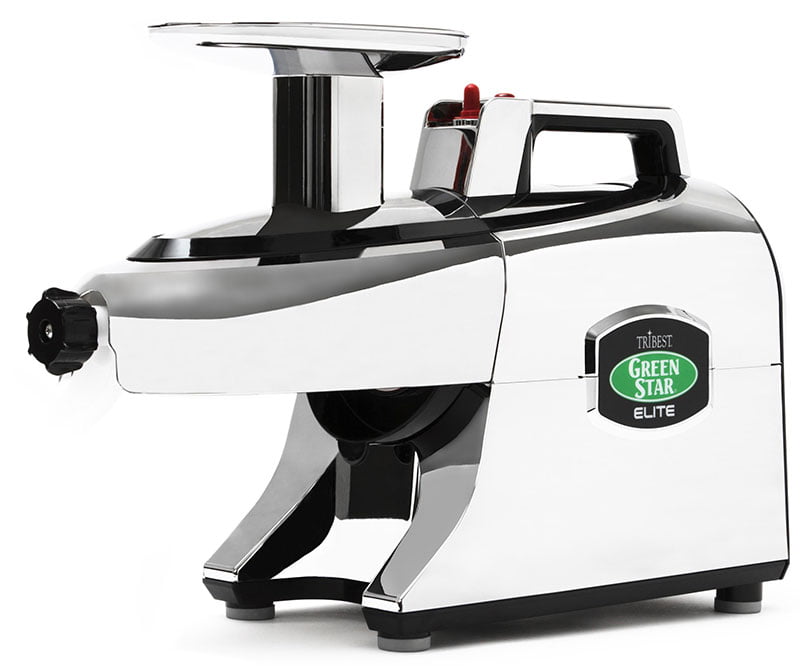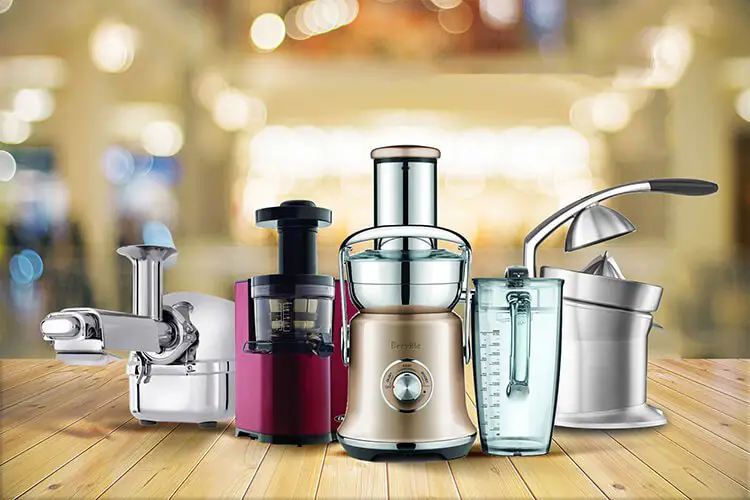Juicing is a great lifestyle choice. It can be effective for weight loss and can be used for medicinal purposes. However, there are three types of juicers available. Learn the differences between them before you go shopping.
On paper, there is no such thing as the best type of juicer. Different types of juicers work in different ways. Choosing the ideal juicer depends on your needs. That is why I wrote this guide. With my help, you will know what kind of juicer will serve you best.
Types of Juicers
There are three main types of juicer. These are:
- Centrifugal Juicers
- Masticated Juicers
- Twin Gear Juicers (aka Triturating Juicers)
Each of these juicer types has unique pros and cons. I will discuss these throughout this guide. This information will help you find the perfect juicer for your needs.
Centrifugal Juicers
Centrifugal juicers are ideal for anybody looking for a fast, easy juicing experience.
These juicers typically have large blades. This means that fruit and vegetables can be fed into a centrifugal juicer with minimal chopping. Most centrifugal juicers will accept an entire apple of carrot without any chopping down to size.

The ingredients are chopped by spinning blades in the center of the appliance. These juicers work very quickly. The blades rotate at over 100 rotations per minute.
The appliance will then release juice into a jug or glass in a matter of seconds. It also separates pulp, so you have a smooth drink.
The biggest selling point of centrifugal juicers is their speed. Your juice will be ready in less than two minutes. These juicers are typically also very simple to assemble and clean. In less than ten minutes, you can prepare your juice, enjoy it, and have your appliance washed and cleaned.
There is a downside to this speed, though. Because centrifugal juicers work fast, they also run hot. This heat can destroy some of the nutrients in your juice.
You will also need to drink your juice quickly. The heat created by this juicer causes oxygenation, and bubbles in your juice. This means it will spoil after an hour or two. These juicers are also very noisy.
A centrifugal juicer is a good choice for novice juicers or people without specific needs. You will gain some nutrition from your juice – just not as much as you would from a slower model.
Centrifugal juicers also tend to be the cheapest appliances on the market. You could always start with a centrifugal juicer and later upgrade.
Pros
- Affordable juicer.
- Fast-working.
- Easy to assemble and clean.
- Small, taking up little tabletop space.
Cons
- Noisy when in operation.
- Juice does not keep for long.
- Not great for leafy greens.
- Some nutrients will be lost.
- The juice will not taste as fresh as when slow-juiced.
Masticated Juicers
Masticated juicers are sometimes referred to as slow juicers. As you can imagine, this means that these appliances work slower than a centrifugal juicer. Patience is a virtue, however. If you are prepared to wait for a masticated juicer, the results will be wonderful.

Masticated juicers typically have one blade, with works at a speed of around 60 rotations per minute. You may also need to pre-prepare your ingredients. Some masticated juicers have wide chutes that accommodate entire fruits and vegetables. In most cases, however, you’ll need to chop them into smaller pieces.
The good news is that a masticated juicer creates highly nutritious and delicious juice. Because they work slowly, these juicers retain all the goodness found in your ingredients. In addition, they release the juice without bubbles or oxygen.
Not only does this taste great, but it also helps the juice last longer. If you refrigerate it, you can enjoy juice from a masticated juicer up to 72 hours after making it.
Many masticated juicers have multiple purposes. You can often make baby food, nut butter, almond milk, and even desserts with these appliances. Just remember that more function means more parts. You will need to disassemble and clean a masticated juicer piece-by-piece.
Pros
- High yields and nutritional content from ingredients.
- Delicious, fresh-tasting juice.
- Can work with hard vegetables, soft fruits and leafy greens like celery.
- Often have additional functions and features.
- Juice lasts for up to three days.
- Quiet whole running.
Cons
- Requires assembly. This means more cleaning and more parts that could break.
- Some models require lots of pre-chopping of ingredients.
- Not always brilliant with soft fruits alone. Harder vegetables may be required in a juicing recipe.
- Can be quite large, requiring plenty of space.
- Juice can take a while to be produced.
Twin Gear Juicers
Twin gear juicers, also known as triturating juicers, are the next evolution of this technology. They work similar to a masticated juicer but use two gears instead of one. This means that juice is crushed even further. Despite this, they still work slowly.

As a result, a triturating juicer does not waste a single nutrient. They produce the highest yield of any juicer, by far. This makes them ideal for anybody who juices for health reasons. The flavor of the juice is also delicious and fresh.
A triturating juicer can work with just about any ingredient. However, this appliance does prefer slightly harder, solid ingredients. If you plan to use fruits with this juicer, it’s best to add an apple or carrot to help push things through.
These juicers can often be used for a range of complex needs. In many respects, a triturating juicer could double-up as a food
processor. Naturally, though, this comes at a cost.
These juicers are more expensive than the other appliances I have profiled. They are also usually large and bulky. All these features may be complicated to operate for a juicing beginner, too.
Pros
- The juice will be delicious, fresh, and packed with
nutrients. - Juice retains freshness for longer.
- Will accept almost any ingredient.
- Come with a range of additional features and
functions.
Cons
- Expensive.
- Very heavy and bulky.
- Lots of assembly and disassembly will be
required, so cleaning takes longer - Works slowly, so not ideal for impatient
juicers. - Can be difficult to operate.
Wrap Up
I hope that this guide has been helpful to you. As you’ll see, different types of juicers serve different needs. If you just want a simple glass of orange juice in the morning, a centrifugal juicer will be fine. If you are juicing for health or lifestyle reasons, a triturating juicer is best.
Masticating juicers sit neatly in the middle. Whichever type of juicer you choose, I wish you nothing but happiness and success in your juicing journey.

